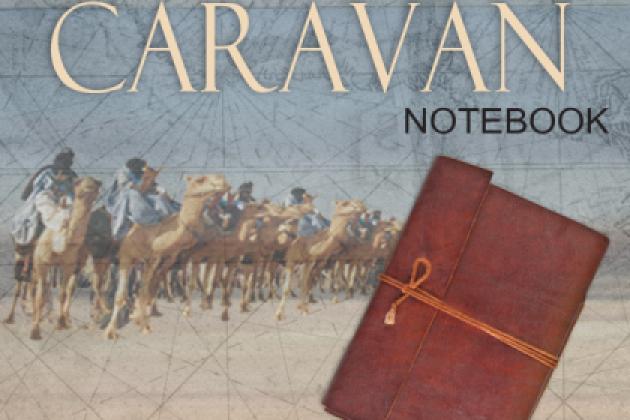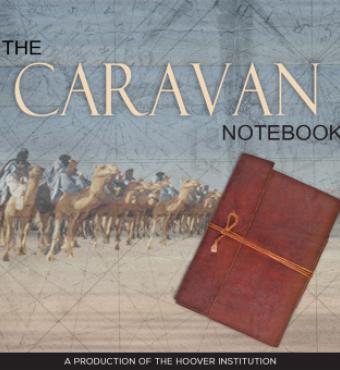Talk of normalization between Saudi Arabia and Israel has been heating up in recent weeks, with American officials visiting Riyadh to hammer out the terms of an agreement and Saudi and Israeli leaders sounding optimistic. But how close to such a deal are we really? Joshua Teitelbaum, a professor of Middle East history at Bar-Ilan University in Israel and an expert on Saudi Arabia, offers his insights on the prospects of normalization. What are the Saudis looking to get out of such an agreement? Why is the United States being asked to provide the inducements? What are the obstacles that stand in the way of normalization and might they be too great to overcome in the near term?
>> Cole Bunzel: Welcome to the Caravan podcast, a venture of the Herbert and Jane Dwight working group on the Middle east and the Islamic world at the Hoover Institution. The working group publishes research and commentary on the Middle east with questions for US policy, and you can find our work at www.hoover.org/caravan.
I'm Cole Bunzel, a fellow at Hoover and member of the working group, as well as the host of this podcast. We have been on hiatus for a year or so, but I'm pleased to announce that the podcast is back. And we will be bringing you regular episodes featuring discussions with leading scholars and policymakers on issues related to the politics of the greater Middle East.
One of these hot button issues right now, of course, concerns Saudi Arabia, led by the 38 year old crown Prince Mohammed Bin Salman, or MBS, and his apparent interest in normalizing relations with Israel. Last month, the crown prince, in an interview with Fox News Bret Baier, confirmed that negotiations over normalization were ongoing.
Saying that, quote, every day we get closer and calling the prospective deal the biggest historical deal since the end of the Cold War. Likewise, Israeli Prime Minister Benjamin Netanyahu said last month at the UN General assembly that we are at the cusp of a historic peace. Someone who has been following these negotiations very closely is my friend Joshua Teitelbaum, who is our guest today.
Josh is a professor of modern Middle East history at Bar-Ilan University in Israel and a specialist in the history of Saudi Arabia. His forthcoming book examines the politics of the royal family and in particular, the role of the Saudi National Guard. Josh is also, I'm pleased to say, a soon to be visiting fellow at Hoover.
He recently wrote an essay for our working group, which I recommend titled US Saudi Relations in Crisis History's lessons, in which he discussed the issue of Saudi Israeli normalization, among other things. Josh, delighted to have you on the podcast, thanks for being here.
>> Joshua Teitelbalum: Thanks for having me on.
>> Cole Bunzel: So in many ways, you're sort of the ideal person to be offering insights into the prospects of US brokered Israel's Saudi normalization. You sort of check all three boxes, as it were, you are an American, you're actually born right here in the area under Hoover Tower. You are an Israeli, and you have spent most of your academic career studying Saudi Arabia.
So this must be a quite exciting time for you on many levels. Did you ever expect that we might actually be talking about this kind of a deal, seriously?
>> Joshua Teitelbalum: I have, I did expect it because it's just been cooking for so long, and I think we'll discuss what are the likelihoods involved.
But I just wanna start with two caveats, okay? First, everybody watching this thing, particularly in the age of the Internet, we have to be aware and pay attention to the buzz, okay? The buzz is created, it's created by three sides that have an interest in pushing this thing, and they're all leaking to journalists to make things seem further along than they actually are, okay.
And to raise expectations, particularly the Israeli side, okay? The second caveat is, I'm a historian. I'm at my best in the past, and I can extrapolate from the past to try to analyze the present. But as for the future, I try to bear in mind that Talmud says that since the destruction of the second temple by Rome in 70 AD, prophecy is the province of fools.
Yeah, so those are things, now, I'll get closer to answering your question. So few historians who actually have read the thousands of documents available in archives should be surprised at this development. We might even ask, why did it take so long? And the reason is this, even though the Saudi leadership, particularly the founder Ibn Saud and his son King Faisal, were deeply anti-Semitic, King Faisal famously used to hand out copies of the Tsarist forgery.
>> Cole Bunzel: Protocols.
>> Joshua Teitelbalum: Protocols elders of Zion and the US diplomats were always complaining about this. Once the Palestinian leadership took a radical turn with the establishment of the PLO in 1964, the Palestinian movement itself became a threat to the regime and to the royal family. We always need to remember we're talking about Saudi Arabia, it's a country named after a family.
Saudi is the royal family, Palestinian people involved with Palestinian movement placed bombs in Saudi Arabia in the 60s and 70s. And they identified with the Soviet side in the Cold War and received support from the Soviet Union. The Palestinian leadership essentially blackmailed the Saudi leadership into giving it millions of dollars.
So the Saudis really wanted to settle the Palestinian issue. For this reason, and for many years now, they haven't been shy about expressing their disgust with the Palestinian leadership at their squandering of opportunities for peace with Israel. So the Saudis like Sadat at that time, they want out.
And it's not so well known that behind the scenes, actually, after the Camp David Accords were signed with Egypt. They tried to get the Arabs to support the Camp David agreements and they supported Sadat financially. And I could go on on, but I'll stop here, but there's actually a clandestine relationship between Israel and Saudi Arabia that goes back to the 1960s, particularly regarding Yemen.
>> Cole Bunzel: That's very interesting, I don't think a lot of people are aware just how much of a kind of relationship has been kind of has existed for decades, which is something that you refer to in your recent essay for us in the caravan. Another thing that you brought up kind of repeatedly in this article was what you style or what you call, and I quote you here, Saudi Arabia's historically pervasive sense of insecurity.
And that's sort of the historical context in which you frame this issue, what do you mean by its pervasive sense of insecurity, why is that important?
>> Joshua Teitelbalum: Okay, so Americans, I would think rightly might be surprised at this, that I would write that their pervasive sense of insecurity.
Since the US led a massive intervention in 1991 after Saddam Hussein captured Kuwait and positioned his troops on the Saudi border. But again, careful historians know that for years the Saudi royal family were scared to death of their own army and they created a separate militia, the Saudi Arabia National Guard to balance it.
There wasn't a half a year that went by in the 60s and 70s without uncovering some Nasserist sympathetic or left wing sympathetic coup or organization planning within the Saudi army. And the US was always hesitant, with good reason, about providing arms and security guarantees for this regime. In the 1960s it still had slavery, okay, but with the Cold War.
>> Cole Bunzel: All right.
>> Joshua Teitelbalum: Yeah with the Cold War, the economic boom caused by the rise in oil prices, After 73, the US became a lot more interested. Huge arms deals, about $140 billion so far, these supported the us defense industry. That meant, of course, more assembly line jobs, but it also meant lucrative post government or between administration jobs with these companies or consulting for the Saudis.
This is known in Washington as the revolving door and MBS knew this, he recently knows this. He recently signed a huge deal with Boeing. He's establishing a new airline to buy, I think, about 50 dream liners or so. And this was spun by the Biden administration as a great boost to American industry and particularly providing jobs for people without a college education.
We know the whole issue of loan, the student loans and how that's such a burden for so many people. And so here the Saudis were helping this out. But all this support, what the US did in 91, and everything has never really been enough for the Saudis. They feel insecure, there are arrestive minorities in Saudi Arabia.
There was the drone attack by Iran in 2019, where the US on oil installations in Saudi Arabia, where the US didn't respond. So they're seeking something more iron clad, because despite all the money, the weapons and the training, the fact is that Riyadh cannot defend itself.
>> Cole Bunzel: I guess the issue that comes up here for me is that if Saudi Arabia's sense of insecurity is sort of a historical constant.
Then something must have changed that has brought the country to the point of wanting to kinda make this relationship with Israel official or normal. So what is that, is it MBS? Is it the threat of Iran? Is it all of these things combined?
>> Joshua Teitelbalum: So, he's linked, MBS has linked.
And we can go into that maybe a little bit later as well, and expand linked normalization with Israel with all these security things that I'm sure we'll get into with the United States. And so this sense of security is historic, it's been there for a long time. But what's changed now is the Iranian threat, which despite, this is very important.
Despite renewed relations and the hyped Chinese mediation and so forth, there's still the basic animosity there. There are two hegemons who are rivals for power in the region, okay? There's the Shiite minority in Saudi Arabia. There's the US, pivot to Asia that is always talked about, okay? How interested is the US really in the Middle east?
Maybe it's not so important anymore, the size thing. Maybe the US is producing most of its own oil. There was the failure, basically a failed policy in Yemen. I mean, they tried to do something in Yemen, they were unsuccessful. The US eventually was not entirely on board. So they want the US to stick around, and this is their way of doing it.
They're trying to kind of leverage Israel and the relationship with the United States and China into getting the US to commit to something.
>> Cole Bunzel: Okay, so let's get down to the mooted terms of a normalization agreement between Saudi and Israel as these terms have been reported in the press.
The most interesting thing about all this talk, as you note in your essay for Hoover, is that it centers on Saudi US relations. Three out of the four points or terms that they've been reported are Saudi demands from the US. So among these four, we have, first, some kind of security guarantee for Saudi Arabia from the United States, kind of related to that accelerated acquisition of the most sophisticated us weaponry.
Which is often held up in Congress, US support for a civilian nuclear enrichment program. And fourth, this is only the fourth point, involves some kind of Israeli concession to the Palestinians. Everything else has to do with the US and Saudi Arabia. So, first of all, do you agree with that brief summary that I just laid out there?
>> Joshua Teitelbalum: Yeah, yeah, I do put one caveat again here, again, as we start to discuss that, so many things that the devil is in the details and we don't know the details. Okay and there are a huge amount of moving parts that would have to come together to make this work.
It's kind of like a Rubik's cube on steroids.
>> Cole Bunzel: Yeah, I mean, there certainly are. I think another thing I should have mentioned here is that, something that the United States seems to be trying to get out of this deal is limitations on Saudi kind of newfound Saudi relationship with the Chinese.
And that also applies to the Emiratis. So it seems like at least in one interpretation of the Biden administration's motives, is some kind of effort to limit that relationship with China. As you wrote in your essay, the Biden administration is concerned about this. And the Saudis are saying, if you can pivot to Asia, we can pivot to Asia, too.
>> Joshua Teitelbalum: Right, I think the Biden administration woke up here, maybe a little bit late, but they woke up here. And there's this transportation system that they've proposed from India all the way through Saudi Arabia to Israel, through Europe and so forth, which kind of is kind of reminds one of.
What are they calling it these days, the one belt, one Road Chinese.
>> Cole Bunzel: Right.
>> Joshua Teitelbalum: It kind of echoes that, but I suppose better late than ever.
>> Cole Bunzel: Yeah, I mean, things move so quickly these days. It's hard to even remember that President Biden or before he was President Biden on the campaign trail, he called Saudi Arabia a pariah and said he would treat it as such.
And then the administration was very reluctant to even utter the words Abraham Accords, the name for the normalization agreements between Israel and the UAE, Bahrain, Morocco, Sudan from 2020, brokered by the Trump administration. So now it's just a kind of complete reversal but in any event, we'll allow for that.
Let's get down into some of these terms. The first, which to me seems, I mean, I think all of these are quite difficult, even on their own, altogether become even more difficult to kind of get over the finish line. But this idea of a security guarantee, first of all, there are many forms which it could take.
There is the idea of an article five NATO sort of binding agreement that would bind the United States to come to the defense of Saudi Arabia if it were attacked. There is something, another idea that I've seen reported is the idea of the kind of agreement that the US has with Japan and South Korea, which is a little bit less, it might be a bit more ambiguous.
But you've seen, I've just saw yesterday that 20 Democratic senators issued a joint letter to President Biden. This included Chris Murphy, Elizabeth Warren, and Bernie Sanders, calling into question this entire idea of a security agreement, writing. And I quote here, that high degree of proof would be required to show that a binding defense treaty with Saudi Arabia aligns with US interests.
So how do you look at this issue? Do you think that there's one form of a security agreement that makes more sense, that's more likely? And how difficult will this be able to achieve?
>> Joshua Teitelbalum: Sure, so this is hugely difficult and again, the devils are in the details.
There are several types of security agreements that the United States has. I guess the strongest one is Article 5 in NATO, but even there, there's some wiggle room. There's something called major non-NATO ally status, which Israel has, Egypt has, Colombia. There are about, I think, 18 countries that have that.
And this makes these countries eligible for defense agreements, but doesn't mandate them. It makes them eligible for accelerated arms supplies, but there's no security commitment. And it's more statement of intent, I think the Saudis are looking for more than that. Perhaps closer to what the US actually has with Japan, where the United States commits to come to Japan's defense.
Again, the language is vague there, or like with South Korea, where the language is even stronger. But still, even with these agreements, with Japan and South Korea, the proof, of course, is in the pudding and in the political circumstances at the time of the event. Of course, NATO itself has a huge common defense apparatus, which the US is unlikely to do anything like that with Saudi Arabia.
So what are these senators, this important letter, I think that you rightly point out. These are leading democratic senators, and they're pushing back against this idea of a US security guarantee.
>> Cole Bunzel: They would have to vote for, right, I think.
>> Joshua Teitelbalum: Absolutely, they'd have to vote for it 100%, right?
I mean, that's what makes what they say so important. So their question, does it align with US interests? And the political challenge here is huge for the administration. Japan and South Korea are robust democracies, and in this respect, they share important values with America. The Senate would have to ratify a treaty that commits the US in such a version.
These centers are all Democrats, they support the administration. But they question whether American troops should be committed to defend a regime with such a dismal human rights record, including the murder of a columnist for the Washington Post, Jamal Khashquji. While Saudi Arabia is famously and well publicized, liberalizing socially and economically, political oppression has gotten even worse.
Now, let me just say, the US has relations with a lot of repressive regimes, okay? But it doesn't have defense treaties, as far as I know, with any of them. And so this is a huge ask from the United States. Which might ask why it should be asked to pay the price to formalize relations between two countries that are moving towards each other?
Anyway, I'll add one more thing here. It's important to note that Mohammed bin Salman, MBS, had good advice when he linked US security guarantees to peace between Israel and Saudi Arabia. That would be a huge achievement, that peace for any administration. But the senators are cautioning against this linkage, that's kind of the other part of the letter.
If it doesn't significantly advance a solution to the Palestinian issue. And they caution against a simply symbolic move on the part of Israel. They're saying that's not worth a security commitment to a non-democratic country like Saudi Arabia.
>> Cole Bunzel: Yeah, and we'll get to the Palestinian component of this in a bit.
It's just one thing, I think, that does make it perhaps more feasible for such an agreement to get passed in the Senate under the Biden administration is the fact that he is a Democratic President. And he would have to bring along presumably at least 10/15 Democratic votes in order to get this over the line.
I mean, this is one of the issues. Is MBS really interested in giving this win to the Biden administration? I've seen a lot of doubts out there about that. Do you think that he has any kind of still grievances against Biden for his calling him a pariah and what kind of, is just using this for propaganda?
>> Joshua Teitelbalum: I think it's deeper than that. I think he sees kind of an opportunity to do, I don't wanna call it trifecta here, Biden is running for reelection. I think if something could get done, he would go for it. I think he would be more comfortable, as he was previously with the Trump administration.
But we'll see how that ends up, but I think, if it could work he would go for it.
>> Cole Bunzel: Great, yeah, I agree with you there. Let's get to the sort of the second part of this mooted agreement, which concerns the idea of US support for Saudi domestic nuclear, enrichment program.
And I won't pretend to be an arms control expert or an expert on nuclear proliferation. But one thing I wanna ask you is, from the Israeli perspective, I've noticed that there's been some resistance to this idea. So what's the mood and how does Netanyahu kind of talk about this in public?
And would the Israeli security establishment really be kind of comfortable with this?
>> Joshua Teitelbalum: Okay, so it's a great question. I'm not a nuclear expert either, I'm somewhat of an expert on Saudi Arabia. And the Saudis wanna be a regional and world power, even a world power. They have amazing aspirations, okay?
Nukes go with that, Iran is a nuclear threshold state. There's an issue of prestige here. And the Saudis want full control over the nuclear fuel cycle, the domestic nuclear fuel cycle. And they say that they've discovered their own uranium, that they've mined their own uranium as well. And so why should they have less than Iran is how they look at it.
But MBS has said more than once that if Iran gets a bomb, Saudi Arabia will go for one as well. Again, the devil is in the details again, okay? And from the Israeli side mostly, Ron Dermer, the head of Israeli security council, has kind of soft pedaled and say there's a way to work around this.
So from the government, they're not using this to quash any hopes. But people in the security establishment who are talking off the record or ex-security establishment people who can talk on the record. Who are in essence still a part of the security establishment we're talking about the same people more or less.
They are really cautioning against this, why should Saudi Arabia be allowed to have this? I mean, it's too big an ask. There are issues we can discuss later about Saudi stability and so forth. So from the Israel perspective, and I've heard some very respected American experts come out against this issue of letting them have full control over their nuclear fuel cycle.
>> Cole Bunzel: Yeah, one thing I should mention here is that I've seen a lot of reporting about how Saudi Arabia is so interested in this. They're going to pursue it regardless of whether the US is willing to cooperate with them or not. And if the US is not interested in helping them develop this program, that their, they're perfectly comfortable going to the Chinese or some other country.
Do you think that's a real kind of threat?
>> Joshua Teitelbalum: I do.
>> Cole Bunzel: That kind of does incentivize the US, if someone is gonna be there, why not it be the United States?
>> Joshua Teitelbalum: Yeah, it does incentivize, you're right, I think they are serious. I think they're serious about advancing their nuclear program and they'll go other places.
And we know there are countries in the world who are willing to help, even in the illegal side of this, so I think it's very important. We have no kind of real proof of this. But there's been a long, kind of long held belief that there is some kind of arrangement with Pakistan for a nuclear weapon.
This hasn't been talked about lately, but I'm sure you remember that. So maybe that's a certain option. But, yeah, I know, I think the US has to take this seriously, and it's not an easy thing for US policymakers to decide. Israel, on the other hand, is not going to give its nod to this unless it's something way out of the box that I really can't conceive of right now.
>> Cole Bunzel: All right, let's get to the next plank of the platform here, which is the Palestinian issue. And you've written in the past about something called the Arab Peace Initiative, which I'll ask you to explain in a minute. But one thing I've noticed, and then that agreement sort of entailed the creation of a Palestinian state in exchange for Arab normalization with Israel.
But what MBS and what Netanyahu seemed to be kinda gesturing at here is something quite less than that, less substantial for the Palestinians. And MBS, in his interview with Fox News the other week, said that he was looking to improve while the Palestinian issue was important to him, he said he didn't use the term Palestinian state.
He said, we're looking to improve the lives of the Palestinians, so what do you think is going on here with the Palestinian issue? How important is it in part of this deal?
>> Joshua Teitelbalum: Okay, it's a great question. Okay so, there are two levels of Saudi discourse. The Arab peace initiative was kind of very prestigious thing, 2002, if I have the year correctly, even though I wrote about it.
And it was approved by all the Arab states, including the Islamic conference, where Iran voted in favor of it as well. And it was considered an achievement, it did involve recognition of Israel. And in Israel there was even debate, should Israel, of course, they can't accept the letter of it.
But should Israel react more positively to it, at least, in terms of the music. And there were some half-hearted attempts at that. But this, of course, is a huge departure from the Arab Peace Initiative. But the two, if you listen to the foreign minister or the recently appointed ambassador to the Palestinian Authority, it's as if the Arab peace initiative is still policy.
And they're both speaking in Arabic as if that's still Saudi policy. But as you've mentioned, if you listen to the Crown Prince, Mohammed bin Salman himself, I don't think Bret Baier even actually asked him about the Arab peace initiative. But his bar is much lower, okay? I mean, because if it's like he's signaling that his bar, he's just looking to improve their living conditions, okay?
And this has few political implications and it's a lot of wiggle room here. I mean, what is it? Giving more work permits, all kinds of things. And so if we were just dealing with a straight Israel Saudi agreement not involving the US, then the sides would be looking for some kind of gesture, some kind of symbolic face saving measure.
I think that's where they're going. Even Ramallah is signaling that for the right amount of Saudi cash, they might swallow normalization. But as we see from the letter of the senators, this still falls short, it's not worth the us commitment. Again, there are a lot of moving parts here that have to somehow move together.
And as I'll say, probably, maybe towards the end, this puts me in a doubtful frame of mind about an entire deal. But let's continue.
>> Cole Bunzel: Yeah, so, I mean, this morning I was listening to an interview with Mustafa Barghouti on Al Jazeera. He's a Palestinian politician and he was talking about this and he said that in his discussions with Saudi officials who are visiting Ramallah.
That they are still adhering to the letter of the Arab peace initiative, that this is their framework for normalization. And then the issue of what MBS said in the interview about improving lives came up and he said, no, that would be unacceptable. That would be like improving the lives of the inmates in a prison.
So, I mean, the other issue is, yeah, sure, Mahmoud Abbas might say, yeah, for the right amount of cash, sign off on this. But the broader Palestinian reception, could it be like an Intifada? I mean, could there be something like this?
>> Joshua Teitelbalum: I'm not so sure about an Intifada, but you're really right to point this up, Mahmoud Abbas is not in good health.
I think he's 87, 88 around there, there's no clear successor to him. Even the people who are mooted as successors are considered so corrupt by most of the Palestinian population that they're weak. So if they give their assent to something that is just face saving, that can cause issues against the Palestinian Authority itself.
Again, another one of these moving parts that is just so hard to make everything work.
>> Cole Bunzel: And perhaps the greatest obstacle is the current makeup of the Israeli government, which I know is an issue you're quite concerned with. And it's often reported that this is the most right wing government in Israel's history.
I don't know if that characterization is entirely accurate. But I certainly am aware of the annexationist kind of ideology behind several of the cabinet ministers, including Ben-Gvir and Smotrich. I've read this Smotrich plan, which is all about kinda paying the Palestinians to leave the West bank. These cabinet ministers have said that they will not agree to any kind of significant Palestinian concession that limits settlement activity.
So, it's kind of ironic that we're talking about normalization in the context of this government. How big of an obstacle do you think it is?
>> Joshua Teitelbalum: It's a huge obstacle. This current consolation of the government, which you did characterize correctly as the most right wing government in Israeli history.
Even though it's only 64, it's not a huge majority, but it is a legitimately elected and constituted government. The point is this, that it would be very hard to make even the smallest concession. Again, what kind of concession are we talking about? Is it a simple face saving measure?
Maybe that would go through work permits, something, certainly nothing that moves towards a two state solution. Certainly nothing that involves a halt to settlements or making a stronger border or what we call a two state reality. But there's another very important point that is, I think, often ignored in analyses of how this government would deal with the possibility of full normalization.
And that's that we're in the midst in Israel of a massive, the largest and most sustained political movement in the country's history. Full disclosure, I'm involved and I support the movement to maintain the independence of the judiciary in Israel. And while I am sure that everyone in this huge movement, we're talking eight months every Saturday night.
And sometimes during the week, hundreds of thousands of people are in the streets, okay? So while we all, who, what Israeli wouldn't support Saudi Israeli normalization? The movement will not let such an agreement become for Netanyahu a kind of get out of jail free card. And he has his own legal challenges, okay?
And permit Netanyahu to carry out what we consider a kind of coup against the independent judiciary. What we need is a constitution and here's the thing. If he tries to revamp his coalition to make it a bit more favorable, in other words, kick out the far right folks and bring in the more centrist folk.
We're talking about Benny Gantz's party and former chief of staff Benny Gantz and Yair Lapid's party. If he's thinking about doing this, basically, these politicians would lose all support of this movement, which is their basis of support now, okay? They're the politicians who are leading the movement to maintain an independent judiciary.
So, in fact, the leaders of this movement are calling, funnily enough, this whole thing, peace washing, okay, in other words, they support. They support it, but not at the expense of this existential battle. What we need is a constitution, and so that's-.
>> Cole Bunzel: Josh, let me back up, because, I'm not a close, close observer of Israeli politics, but from what I read, Benjamin Netanyahu is not wedded to the idea of judicial reform.
That's not his kind of pet project. That's more an issue of the coalition, the far right ministers. His legacy, if he were able to achieve his normalization with Saudi Arabia, would be cemented. That must be a greater priority for him than judicial reform. And wouldn't he prefer being able to change up the cabinet, get Benny Gantz in there.
Put his legal troubles behind him, get rid of the issue of judicial reform, and push ahead with normalization sort of instead? Or is that just, am I misreading?
>> Joshua Teitelbalum: You have an important point, he has overseen this whole thing, okay? He is the person behind this entire thing, it could not have happened without him.
It also has to do with his own legal troubles, he himself has delegitimized the judiciary. Ever since he's been on trial and undermined the judiciary. This kind of talk we hear in the United States, too, about, the elites controlling everything. The Ashkenazi elites and himself is from the Ashkenazi elite, if anyone was ever.
So, what would it take for the movement to support him? Would be revamping what's already been pushed through, which is this reasonable clause, which we can't really get into. To Americans, it's very difficult to understand but for us, it's very important. When you can't rely on the politicians to be reasonable, your only resort is to have the Supreme Court be reasonable.
When the government refused to fund the hardening of buildings in the south against Hamas rockets, the court said this was unreasonable. Okay, you have a budget for it, you should do it. And they forced them to do it, okay? So he'd have to do that, Netanyahu, and he would have to entirely freeze all, all legislative initiatives and enter serious discussions on a constitution.
These are all big asks from him.
>> Cole Bunzel: Okay, so I think what we're getting at here, coming to the end of our discussion is, you seem to be a bit skeptical that all of these kind of obstacles can be overcome simultaneously. Every one of them, just taken by itself is quite, quite difficult in my making, is that right should I characterize your position as one of skepticism?
>> Joshua Teitelbalum: So I'll just elaborate a bit why I'm skeptical, although, as I think I've said, I hope I'm proven wrong, okay? I hope I'm proven wrong cuz I support full normalization. Any Israeli would, okay, but I hope I'm proven wrong. But there are so many moving parts, and this is why I'm skeptical.
And first of all, let's look inside Saudi Arabia itself, okay? The backlash from in Saudi Arabia would come more from full normalization with Israel than an upgraded security relationship with the United States. And that's one of the reasons why MBS has tied these two together and we have to be careful about being carried along by this orchestrated buzz.
But full blown normalization, I don't think, is likely, I think it will be a slower and more partial process. The Saudis need to bring along public opinion, and they're taking a page out of the UAE's playbook. They're just not as far along as the UAE, okay? We basically haven't reached America's like a football metaphor, we haven't reached the final quarter yet, okay?
Just like the UAE did, the Saudis are making Judaism as a religion more acceptable, okay? They have to undo years of anti-Semitic education. This has included already changing their textbooks and highly publicized visits of Saudi officials to Auschwitz, where the scene of one of the murders, hundreds of thousands of Jews in the Holocaust.
And we've seen incremental things, they're happening every day. Israeli E-sport teams have visited Riyadh, okay? E-sports, I don't know how many people know that, but there's e-soccer, and these are competitions that happen online. Mostly younger people than me do this. And Mohammed Bin Salman himself said, I think in the interview, he's into video games.
Crazy into video games.
>> Cole Bunzel: Nery into video games.
>> Joshua Teitelbalum: Right, so just this week, two Israeli ministers visited, as well as part of international meetings.
>> Cole Bunzel: Tourism minister and communications minister.
>> Joshua Teitelbalum: Yes, they visited as well. And so what the Saudis are doing, they need to make Judaism kosher or Halal, and then Israel.
So it's a slower process. Now, Saudi Arabia is a much more liberal place than it once was. Who would have thought, raves in the desert, Mariah Carey, women driving? But historians remember the 1979 takeover of the grand mosque, we remember 911. And both are protests against modernization and westernization.
Now, normalization, full-blown normalization. Okay, this is in Dubai, okay? This involves tourists, Israeli tourists can be an undisciplined crowd, all right? Just ask the Turks or the Cypriots, okay? Are the Saudis really ready to hear Hebrews spoken loudly in the cafes of Najd, okay? To have scantily clad Israeli tourists on the beach like in Tel Aviv?
Are they ready for every Israeli who wants to post a TikTok video of themselves holding an Israeli flag at the Prophet's mosque in Medina, okay? These are a lot of things, okay? So there's a long way to go. And just this within the past 24 hours, there's a blogger in Saudi Arabia, a blogger influencer.
His name is Mohammed al Saud, I don't think he's related to the Saudi royal family, but he's in love with Israel, he loves Bibi. He's been here to Israel, he knows a bit of Hebrew. He has this huge presence, he's gone silent in the past 24 hours, okay?
He had published that he was going-
>> Cole Bunzel: He was spit on, was he?
>> Joshua Teitelbalum: He's the one who was spit on when he visited the old city and had chairs thrown at him, okay? But he's why Bibi's talked to him, he's shown them talking to each other now.
You mean the communications minister, Shlomo Karhi, was there. And this is over the Jewish holiday of Sukkot, the feast of tabernacles, the feast of booths, when we build these booths outside. And Mohammad al Saud said he had built one, was going to invite Shlomo Karhi to come and visit.
By the way, Shlomo Karhi, held in his hotel, well-publicized Sukkot services, waving the palm fronds and all these other things, including showing for the first time, this is what I'm talking about. A Sefer Torah, a Torah scroll for which the mantle, the covering says in Hebrew, Arabic, and English, or maybe just Hebrew and Arabic, dedicated by the Jewish community of Saudi Arabia.
Good morning, okay, to His Highness, his Royal Highness Salman, and his son, and so on and so forth. And this was taken pictures of, he's disappeared for the past 24 hours. So this is why I think we're most likely to see a much slower and gradual process. And there's a lot of kind of a constant testing of the waters, constant trial balloons.
And this has already begun, as we've discussed, and there are a lot of partial things that could be done. Direct flights of Israeli Muslim pilgrims directly to Mecca from Israel. Now, they have to go through Jordan, it's very complicated. There could be interest sections in embassies, there could be special business visas.
There could be trade ligations, as Israel had with Qatar at one stage. And one thing that could be done, perhaps we don't have time to go into it, but people know about this huge project up on the border there with Egypt, Israel, and Jordan called Naom, which is practically an ex-territorial kind of place.
Maybe special tourist visas just for Naom, for Israelis, which might be an easier swallow. So what I wanna say is, I don't, I hope I'm wrong, but I don't see full normalization like the Abraham Amicor coming soon. But I'm hopeful that there can be partial steps.
>> Cole Bunzel: That does make sense.
It is somewhat ironic that so much of this mooted agreement is predicated on enhanced security for Saudi Arabia when the fact of such a normalization agreement could actually jeopardize Saudi national security in terms of potential domestic backlash. So taking it slow, if I were the crown prince, taking it slow would be my approach.
But as we know from West Crown Prince, he doesn't take it slow. So there`s something to that.
>> Joshua Teitelbalum: He can surprise us and he's creating the music of something fast. But we'll see, and I'm sure there are people who he's made very angry in Saudi Arabia. We don't know how much power they have, there's a lot we don't know.
And again, this is where I feel kind of I'm skating on thin ice here about predicting.
>> Cole Bunzel: I know where one of my advisors at Princeton, who's a historian, like to say that he's paid to study the past, and he's not paid nearly enough to predict the future.
>> Joshua Teitelbalum: There you go, I like that.
>> Cole Bunzel: But let me say, vision 2030 is this big hallmark national project that's been articulated and promoted by MBS, what do you think? By the end of Vision 2030, are you gonna be standing in Riyadh celebrating as an Israeli?
>> Joshua Teitelbalum: So what is that seven years away about?
Again, I'm doubtful, I'm skeptical, it's seven years. I don't know what I'm gonna have for breakfast tomorrow, or it's so far down the road. There's so many obstacles, even to that program itself. He's done okay so far, he's had some stumbles. Jamal Khashoquji was a stumble, maybe he's learned.
But, he's gonna be around for a long time, he's young and his father probably does not have long for this world. So he's gonna be around for a long time and he could grow into the job and become more realistic. He does seem to have support of the young people, but they're not the only constituency there, so he could make a mistake, he's bold, he's bold but their mistakes could be named.
The problem is we don't know enough about the people who he's angered and more importantly, how much power and support they have.
>> Cole Bunzel: All right, final, final question, Joshua, before I let you go, hopefully, a funny one there, let's say, since as an Israeli citizen, I take it that you haven't been venturing into the magical kingdom too frequently.
So, what saying it there is normalization by 2030, what's the first place in Saudi Arabia that you would wanna go?
>> Joshua Teitelbalum: Well, I think, I wrote a dissertation and a book on the Hejaz, the area of Mecca and Medina. So non-Muslims are not allowed to visit Mecca, I would have liked to visit Mecca, I think I know an awful lot about Mecca.
And I think, it used to be that non-Muslims couldn't visit Medina either, but I don't for how long they are now visiting Medina. So, I think I would like to visit, right I mean, you were there recently, if I'm not mistaken.
>> Cole Bunzel: I was able to go to Medina, it was, I have to say, it was awkward, the pilgrims did not like the appearance of Western non-Muslims standing outside the prophet's mosque, it was very tense.
>> Joshua Teitelbalum: Okay, imagine some Israelis-.
>> Cole Bunzel: That's another obstacle.
>> Joshua Teitelbalum: Imagine some Israelis in shorts and halter tops with an Israeli flag in front of the prophet's mosque, okay, so anyway.
>> Cole Bunzel: No, I think that there would need to be some restrictions on that
>> Joshua Teitelbalum: Right, we're an undisciplined crowd when we get overseas, you should just know that we like to party.
So anyway, yeah, so it would be something like, it would probably be Medina. And then I think the desert, the Rubel Khali and parts of Naj that are, I would say, very conservative where the Ihuan comes from, I think those will kind of be the places I would like to go to.
I'm less interested in the glitz and more interested in the In the history as you know, we're both historians, so that kind of attracts us.
>> Cole Bunzel: Yeah, I'm not so attracted to the Formula 1 races in Diriyah these days.
>> Joshua Teitelbalum: Yeah, really.
>> Cole Bunzel: Once a day, historic Wahhabism.
>> Joshua Teitelbalum: Exactly, exactly, which is what you're writing on, and so, well, if I can say that.
>> Cole Bunzel: All right, well, thank you, appreciate it, that's a plug for my new book
>> Joshua Teitelbalum: Exactly, where's it, we're not in video, otherwise, you could plug it anyway, read that book, Wabiz and Princeton University Press.
>> Cole Bunzel: All right, thank you, Joshua, thanks for coming on the Caravan podcast, once again you can read Josh's recent essay, US Saudi Relations in Crisis History's Lessons on our Hoover website, hoover.org/caravan. You'll also find there are a number of additional pieces on Gulf Politics and Saudi Israeli Normalization.
By the way, if you wanna learn more about Israel's constitutional crisis, Josh highly recommends my Hoover colleague Peter Berkowitz's recent piece in real clear politics titled Steadying Israel by Recalibrating the Separation of powers. Please subscribe to the Caravan podcast, we'll be back soon for a further episode.
>> Female Speaker: This podcast is a production of the Hoover Institution, where we advance ideas that define a free society and improve the human condition.
For more information about our work or to listen to more of our podcasts or watch our videos, please visit hoover.org.

















